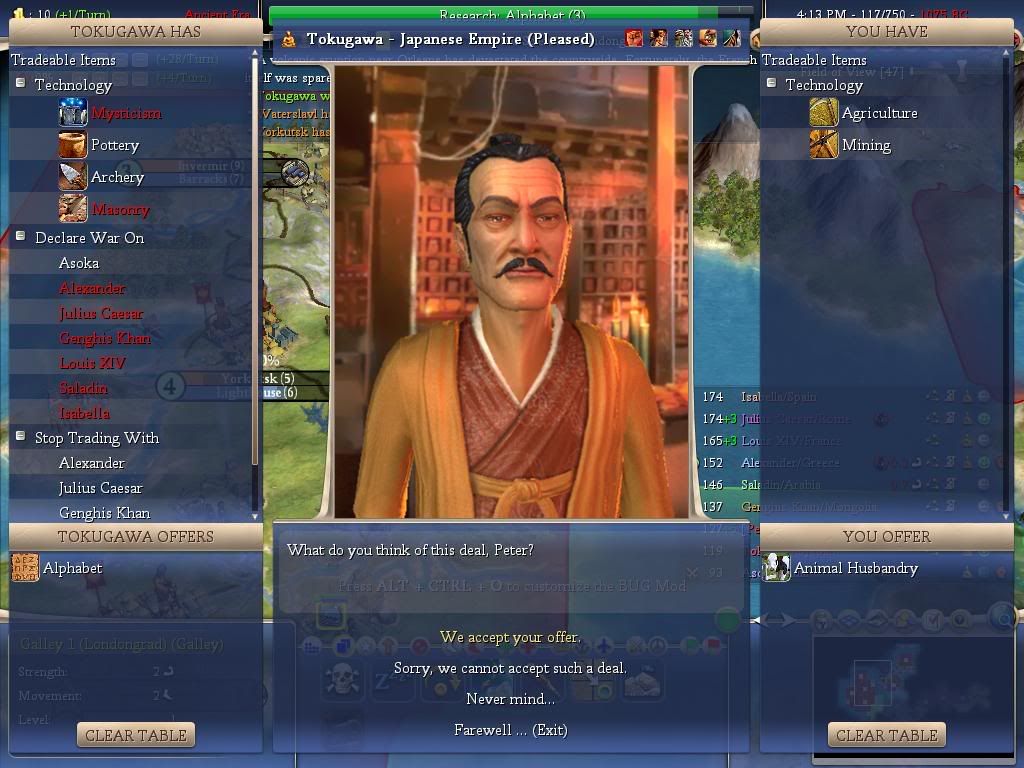Peter was restless on his throne. The subchiefs complained bitterly about the location of Londongrad and coveted Wonders of the World, while largely ignoring the vast tracts of Scandinavia that as yet stood unclaimed

)). Peter, though, was a true visionary. Between sips of tea-infused vodka, he ordered his Settlers to claim the fjordlands for Mother Russia:
For the moment, Blokhov was a mere barrier to Greek Settlers from the south, but soon, it would become a major mining city, the Production capital of the empire.
Our lone Scout, meanwhile, sought to seek out new life, and new Civilizations, to boldly go where no Russian has gone before. This mission met a significant roadblock in the form of the Hellenic Japanese, who refused safe travel through the Aegean:
The Scout was, therefore, forced to trek through Roman Siberia, where he was killed and eaten by the natives.
After a few more years, Invermir was founded in the Scottish highlands, and the simple faith of the Buddha came to the islands:
This went a long way to easing the sour mood in Londongrad, which was exacerbated by both urban crowding and the occasional government hit squad sent to abduct people for forced labor. Good of the people, and all that.
Across the channel, meanwhile, Saladin continued to be intoxicated by the riches of his capital city:
Looks like that particular disease, anyway, is a matter of geography more than personality.
By the middle of the second millennium B.C., Peter learned that his subchiefs were right. The Greeks weren't after us, but rather the unassuming Asoka, to the south:
He later demanded a shipment of Sheep for his table. I suppose that the Greeks need their mutton, no matter where they're situated, globally. Can't make a gyro without lamb, after all.
Times were tough all over the empire in those ancient days. The economy creaked and groaned under the weight of expansion, and, despite their masters' suggestions to meditate their worries away, the slaves of Londongrad refused to work unless their grievances were addressed:
This led to sweeping changes in the Russian slave system. Lunch breaks and a 50-hour week were introduced, and Peter promised to only use the whip in emergency situations. This latter oath wasn't worth the clay tablets it was inscribed on, of course, but it did get the wheels of industry turning again. There you can also see Waterslavl (after Waterford, though I do like the idea of St. Patricksburg, and may well change the city over in the next round) growing into its own.
Russian Settlers also founded Oslodonsk on the southern shores of Scandinavia:
What was fascinating was the troupe of four Greek Workers roading down through the peninsula to build a Pasture on those Pigs at the tip of the peninsula. It certainly saved me a good number of Worker turns. And, though I was always ready to close borders, Alexander never sent a Settler through.
With a true Russian Alphabet nearly formulated, Peter turned to an unlikely source for a few final tips on punctuation and the like:
He was much more polite than the Mongols, who demanded Agriculture, and the Greeks, who begged for Sailing. In the interests of peace, Peter complied with both requests, though they did vex him to some degree.
With the founding of Trollhelsk (likely our final city for a while), I decided to call an end to the round. Here's a look at our sizeable, if underdeveloped, empire:
And the Tech screen:
Caesar is apparently on the cusp of Alphabet, so we can't get Iron Working for it. And we're still at war with Asoka. Who knows how long he'll hold out?
Anyway, here's the save:

 )). Peter, though, was a true visionary. Between sips of tea-infused vodka, he ordered his Settlers to claim the fjordlands for Mother Russia:
)). Peter, though, was a true visionary. Between sips of tea-infused vodka, he ordered his Settlers to claim the fjordlands for Mother Russia:










